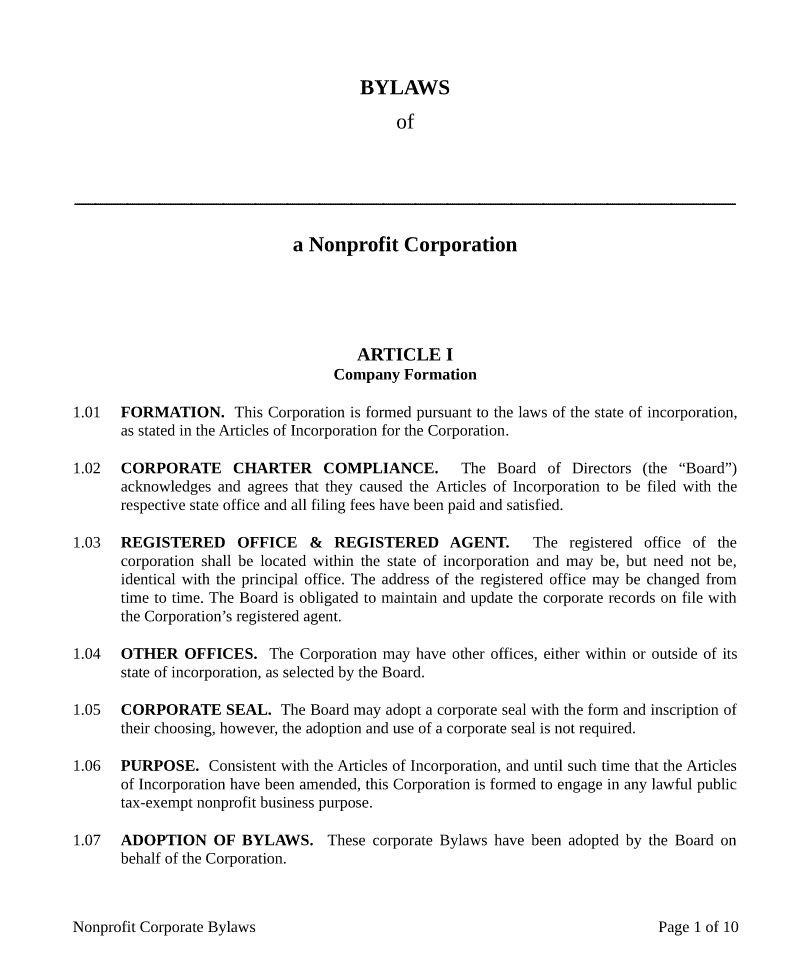Colorado Nonprofit Bylaws
Colorado nonprofit bylaws are the internal rules by which a nonprofit is governed. Bylaws define how your nonprofit runs, pays, and hires among many other procedures essential to the success of your nonprofit. While Colorado nonprofit bylaws aren’t required in Colorado, they save your nonprofit from being organized and ruled by the generic rules made by the state.
To get started, you can use our attorney-prepared nonprofit bylaws template.
Why does a Colorado nonprofit need bylaws?
Since your nonprofit bylaws aren’t required in Colorado like your Colorado Nonprofit Articles of Incorporation, the Colorado Secretary of State has more leeway over how your nonprofit is run and organized if you don’t have bylaws in place. Here are some more reasons why they’re so important.
1. Nonprofit bylaws aren’t legally required in Colorado.
Though they aren’t required by law according to CO Rev Stat § 7-122-106, nonprofits without bylaws are subject to general ruling and organization. For instance, according to CO Rev Stat § 7-126-202 “unless otherwise provided by the bylaws, no member of a nonprofit corporation may transfer a membership.” Also, Colorado nonprofits without bylaws cannot apply for 501(c)(3) tax-exempt status with the IRS.
2. Third parties will ask to see your bylaws.
Not only are directors and officers allowed access to the bylaws, but their attorneys can access them, too. Applying for tax-exempt status? You’ll need to attach bylaws to your application. Banks, landlords, donors, and other third parties will also request to see them throughout the course of you setting up your nonprofit’s location, accounts, and legitimacy.
3. Nonprofit bylaws allow you more control over your nonprofit.
Since Colorado doesn’t require nonprofits to have bylaws, their Colorado Revised Statutes (2018) outline several organizational and procedural aspects of nonprofits. An example being CO Rev Stat § 7-126-303 that states nonprofits cannot “purchase the membership of a member who resigns or whose
membership is terminated.” One of the most important aspect of bylaws is the ability to decide how these issues are handled yourself, saving you the time of dealing with how the state thinks your business should be run.
Want to learn more? Check out our Guide to Nonprofits.
What do Colorado Nonprofit Bylaws include?
Your bylaws should provide your board of directors comprehensive guidance on how to:
- add or remove board members
- give notice and hold board meetings
- take a vote
- handle conflicts of interest
- compensate directors
- keep records
- amend the bylaws
- operate during emergencies
- dissolve the nonprofit
Along with that, your Colorado nonprofit bylaws should include basic information about your nonprofit like its name, business address, and purpose. You should also include specific directions and guidelines for how your nonprofit should function internally.
Are nonprofit bylaws legally binding?
Yes. Once a nonprofit adopts bylaws, whether signed or not, they become a legally binding agreement on how your nonprofit operates. Without bylaws in place, during legal or business disputes, you’ll have to refer to Colorado code.
Are nonprofit bylaws public record?
Yes and no. While Colorado nonprofit bylaws aren’t considered mandatory public documents, when you apply for 501(c)(3) tax-exempt status with the IRS, you’ll need to attach your bylaws to your application. The IRS will make your application (and the attached nonprofit bylaws) public.
FAQs
No. However, having your board and directors sign your nonprofit bylaws will further legitimatize them and guarantee everyone is on the same page.
Yes. A nonprofit’s board of directors or members can amend the bylaws unless otherwise stated in the bylaws or it would cause a change in a membership class (CO Rev Stat § 7-130-201).
Your Colorado nonprofit bylaws are adopted by the board of directors. In lieu of having a board, incorporators can adopt the initial bylaws at your nonprofit’s first organizational meeting.
